The Beekeeper Inn
Mildred Ruffner and Cindy Newton are fictional characters from Laura Boggess’s novel Mildred’s Garden. The Beekeeper Inn and the village of Helvetia are very much real places. If you ever find yourself in Helvetia, West Virginia, we hope you’ll stop by by The Beekeeper Inn. You won’t be disappointed.
* * *
When Mildred Ruffner and Cindy Newton decided to open a bed and breakfast, they called on the rich hospitality community in their home state of West Virginia to educate them. “Why, if I can help you avoid the mistakes I made when I opened my inn,” one helpful proprietor told them, “I’d be more than glad. It takes a village, you know.” Mildred and Cindy arranged to visit and tour several bed and breakfasts near or around their proposed site to see what they could learn. What follows are some notes from Mildred’s journal detailing some of the things they learned on their visits.
Name of bed and breakfast
Setting
Helvetia, West Virginia, a little village with Swiss and German roots in the mountains of central West Virginia. The center of the village is the Hütte Restaurant, a local gathering place and attraction, serving Swiss-American food made from locally sourced ingredients. The Hütte (pronounced “hoo-tey”) is one of the stars of the critically acclaimed documentary Born in a Ballroom and boasts a visit from the Travel channel’s Bizarre Foods host Andrew Zimmerman. A fun time to visit Helvetia is during Fasnacht, held the last Saturday before Lent and described as a “mountain Mardi Gras.” Revelers don masks, masquerade and dance all night long until the evening culminates in the burning of an effigy of Old Man Winter, ushering in spring.
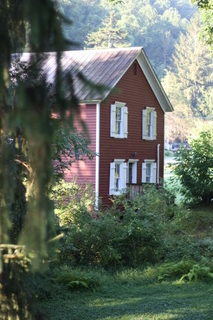
“Mildred, would you pu-lease slow down? I don’t feel so well over here.”
Cindy had a death-grip on the little handle above the passenger seat window. I threw her a sidelong glance and grinned as we wound our way around yet another hairpin curve. She did look a little green around the gills.
“I love driving through these mountains. These are the kind of roads I learned to drive on.”
“I understand, but if you don’t start taking these turns at a more reasonable pace, you’re going to have to let me out so I can walk over the mountain just like the original Swiss settlers.”
I eased my foot off the gas pedal. A tiny bit.
“I was hoping to make it there before sunset. Kay wants me to call when we get to Rock Cave, and we’re almost there. She says it’s likely we won’t have cell service after that. She wants to make us some sandwiches since the Hütte will be closed by the time we roll into town. I’m hungry.”
“You’re always hungry.”
I ignored that. “Why don’t you call Kay for me and let her know we’ll be there in twenty minutes?”
While Cindy chatted with Kay, I let my mind wander. It wasn’t hard to imagine we were in a remote village in Switzerland, what with all the rolling farmland and the blue, cloudless sky. I half expected a plaited Heidi look-alike to emerge from one of the barns populating the roadside meadows.
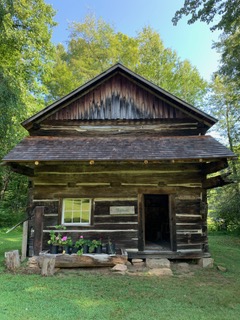
We finished the last few miles in silence. I slowed down to a crawl when we passed the Hütte, cheered by its bright façade glowing in the magic light of sunset.
The Beekeeper was an easy find from there. A woman waved to us from the front yard, a brown paper sack in her hands. My stomach growled. We parked in front of the inn and Kay greeted us warmly as we got out of the car.
“Welcome! I hope you had a nice drive!”
She walked us to the front entrance—a red double-door with iron working and a sign above.
“Grrüss Gott und Willkowmen,” Cindy read, slowly. “What does it mean?”
“It’s a traditional welcome,” Kay smiled. “It means something like, ‘God bless you and welcome.’”
We followed her through the heavy doors into a cozy sitting room.
“This is the common area, as well as the kitchen. You’re our only guests this weekend, so you have it all to yourself!”
She gave us a quick tour, asked when we would like breakfast in the morning, and handed me the bag with our dinner.
“Enjoy!” Kay said, and left us to settle in.
Cindy and I were nosy and so we peeked in on the other two bedrooms. They both had a cozy feel, with vintage wallpaper, oversized beds and antique furnishings. Our own room was the only one with two beds—Cindy plopped down on hers and proclaimed the mattress “the perfect combination of firm and soft.” Kay had placed fresh wildflower arrangements in every room.
“Look how gorgeous,” Cindy murmured, fingering the silky florets of white viburnum. “She’s used all the familiars—Joe-Pye weed, ironweed, fleabane … is that milkweed? Most people would just think of these as weeds but I’ve ever seen such beautiful arrangements.”
I had to agree, but there were more serious matters to attend to. “Guess what?” I asked my best friend.
“You’re hungry.”
“How did you know?”
We found the deck off the upstairs hallway and settled into two Adirondack chairs, a small table between us for our feast. I dug the sandwiches out of the bag, along with some accoutrements.
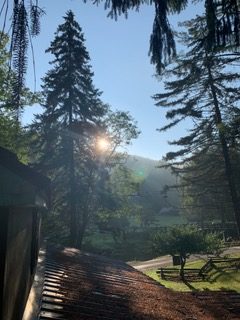
Cindy leaned over to give me a glimpse of her sausage sandwich. I must have looked pained. “Do you want to switch out halvesies?”
“Yes! And what are in these tiny side dish boxes?”
Cindy’s eyes twinkled. “Applesauce. And sauerkraut.”
“Sauerkraut??”
We ate with relish. “If this is what Kay packs for a light dinner,” I said, “I can’t wait to see what the Hütte serves us for breakfast tomorrow.”
The Beekeeper was owned and operated by the same folks who owned the Hütte restaurant, and that was where our breakfast would be served in the morning.
Cindy made a noise of agreement, mouth too full to speak. We fell into a comfortable silence. The deck overlooked a lawn treed with giant pines and firs. Several blue jays fussed at us as we dined, diving in and out of well-cloaked branches. We had made it in time for sunset after all and the sky took on a rosy hue around the tops of the hills. I could feel my mind and body sinking into the slow pace of the hills and the trees and the 150-year-old village that hugged us gently. I heard Cindy sigh contentedly beside me.
After our tummies were full, we decided to explore the village. The sun had disappeared behind the surrounding mountains but there was still light enough to see by. We walked around the Cheese Haus and peered through the windows of the Honey Haus at antique teapots and cream pitchers. Everything was closed except the Kultur Haus, which housed the post office, a general store and the Fasnacht Mask Museum. We bought some locally made cheeses and honey. I eyed the masks nervously—it felt like we were being watched. Dark was fast-approaching so we decided to call it a night and explore some more in the morning.
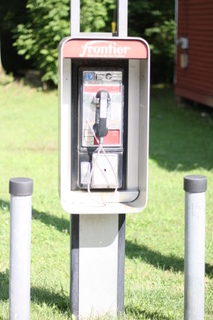
“I don’t know if I remember how to use one of these,” I joked, picking up the receiver playfully. “Do you need to call anyone?”
Cindy just raised her eyebrows, unamused. We both knew neither one of us had anyone to call.
Back at The Beekeeper, we settled in to the cozy sitting room. Cindy was drawn to a curio with wallpapered shelves, filled with all kinds of curiosities—an old bellows, a rusty scale, deer antlers, an iron candle-holder, even a sculpture of a goat.
“I love old things,” she said. “Everything smells so … old. Not, like musty, but like a place shaped by 150 years of work and love.”
I nodded, feeling the reverence her voice conveyed.
There were board games and books. No television. No internet. Not even a radio. We looked at each other, at a loss for one brief moment. But then I picked up a book of poetry.
“Treasury of Favorite Poems. Edited by Louis Untermeyer.” I opened to the front leaflet. There was an inscription. “A gift to the Beekeeper Inn. March 21, 2004. Charles J. Denham. How sweet!” I opened the body of the book randomly and landed on a selection of Walt Whitman’s Song of Myself.
“I celebrate myself, and sing myself,
And what I assume you shall assume,
For every atom belonging to me as good belongs to you.”
I had to stop reading because that last word caught in my throat. Cindy patted my hand. “It’s beautiful,” she said, quietly.
We read poetry out loud to each other for the rest of the evening. I don’t think I’ve ever had such a lovely night.
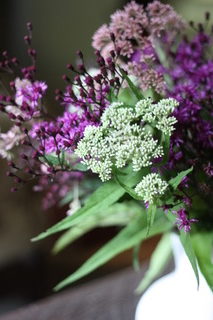
Kay served us at a table on the front porch. The food was even better than expected—omelets, fresh fruit, thick cut ham, toast from homemade bread and homemade preserves for topping. My tummy was so happy. To make things even sweeter, we were joined on the porch by a neighborhood dog, a doleful-eyed black lab who conned me out of a bite of ham.
“Mabel!” Kay called from inside the screen door. “Stop your begging!”
Mabel, I thought. I’d just read the meaning of that name somewhere. Ah, yes. It was the name of Helen MacDonald’s hawk in H is for Hawk. Mabel, she said, is “From amabilis, meaning loveable, or dear.” Yeah, I thought. That sounds right. I reached down to scratch Mabel’s chin—which she only allowed in exchange for a piece of toast crust.
After breakfast we walked down to the library and the museum. The museum was usually closed on Sundays, but Kay called the local librarian, who was also the curator, and she agreed to unlock the building for us. Only in Helvetia, I thought. The museum had some memorabilia from the original settlers, including the original Swiss flag they carried with them to their new village.
Before leaving town, we stopped by the Helvetia Cemetery, established in 1870. Many of the names on the headstones were in German. The quiet of the cemetery was companioned by a babbling stream and sunlight moved across the water in ripples of light and shade. A copse of evergreen trees made a rustic perimeter around the graves. I thought it made a nice place to rest.
The sun was climbing high in the sky and Cindy was making a rubbing of one of the moss-covered graves. I knew we needed to get on the road. I cleared my throat.
Without looking up, Cindy said, “Let me guess.”
I smiled. “That’s right. I’m hungry.”
Featured photo by Joe Bolonski, Creative Commons, via Flickr. In-post photos and post by Laura Boggess.
Special Tea for Your Visit
Take some delicious tea with you to The Beekeeper Inn. (if you’re the type who likes to bring your own along). Or staycation and treat yourself to Plum Deluxe tea at a discount.
Special discount available for patrons throughout September, in honor of the release of Mildred’s Garden.
Winner of the West Virginia Writer’s Competition!
- Year of the Monarch—A Visit to Craik-Patton House - September 18, 2024
- Year of the Monarch: Butterfly Dreams - March 20, 2024
- Year of the Monarch: Harvesting and Planting Milkweed Seeds - November 15, 2023
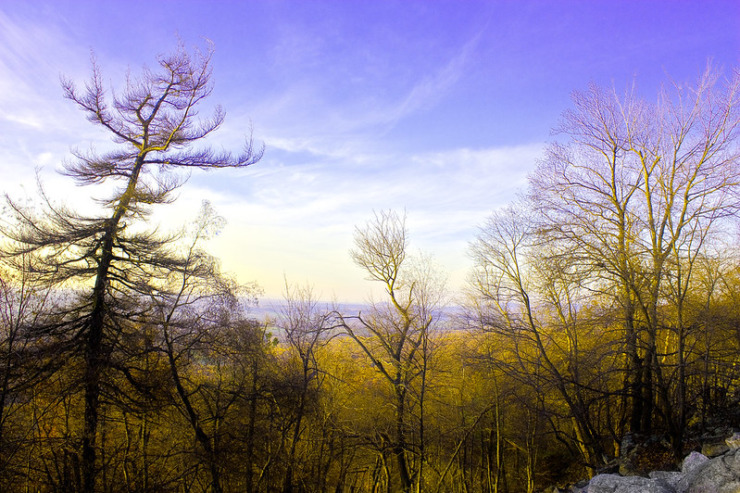



Katie Brewster says
Laura,
This post makes me even more eager for my copy of Mildred’s Garden to arrive.
And I loved H is for Hawk. Also, the PBS documentary of the same.
Katie
Laura says
These little stories have been so fun to write 😊. I’m glad you enjoyed this one, Katie. I hope you enjoy Mildred’s Garden too!